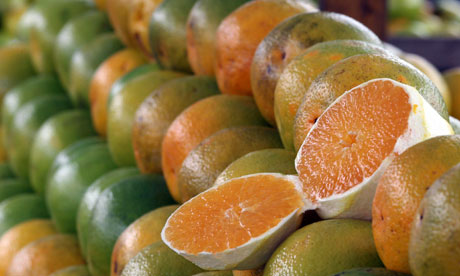Coca-Cola Company acknowledged Thursday it was the company that alerted federal regulators about low levels of fungicide in its own orange juice and in competitors' juice, prompting juice prices to rise and increased government testing for the residue.
The Food and Drug Administration and the Environmental Protection Agency have said orange juice is safe to drink.
Atlanta-based Coca-Cola, which makes the Minute Maid and Simply Orange brands of orange juice, said Thursday it had notified FDA of low levels of the fungicide carbendazim. The FDA had said Monday that an unnamed company had told the agency about the fungicide and confirmed Wednesday the company was Coca-Cola.
Neither the FDA nor the company said which orange juice products tested positive. Carbendazim is not currently approved for use on citrus in the United States , but it is used in Brazil, which exports orange juice to the United States.
"This is an industry issue that affects every company that produces products in the US using orange juice from Brazil," said Coca-Cola spokesman Dan Schafer.
Most orange juice products made by Coke and other companies contain a blend of juice from different sources including Brazil. In addition to Coca-Cola, Pepsico Inc's Tropicana brand is one of the largest US orange juice producers.
Fungicides are used to control fungi or fungal spores in agriculture. The US government has not has not established a maximum residue level for carbendazim in orange juice and has not said what levels of carbendazim raise concerns. The FDA said Coca-Cola found levels up to 35 parts per billion of the fungicide, far below the European Union's maximum residue level of 200 parts per billion.
In its letter to the Juice Products Association earlier this week, FDA official Nega Beru said the agency will begin testing shipments of orange juice at the border and will detain any that contain traces of the chemical. Because it is not approved for use in the United States, any amount found in food is illegal.
Beru said that because the FDA doesn't believe the levels of residue are harmful, the agency won't remove any juice currently on store shelves, though that juice is also being tested.
He asked the industry to ensure that suppliers in Brazil, the world's largest orange producer, and other countries stop using the fungicide.
"If the agency identifies orange juice with carbendazim at levels that present a public health risk, it will alert the public and take the necessary action to ensure that the product is removed from the market," he said.
Coca-Cola shares fell 40 cents to $67.66 in morning trading Thursday. PepsiCo shares fell 28 cents to $64.73 per share.
The discovery comes after the FDA said it would also step up testing for arsenic in apple juice. FDA officials said last year that the agency is considering tightening restrictions for the levels of arsenic allowed in the juice after consumer groups pushed the agency to crack down on the contaminant.
Studies show that apple juice has generally low levels of arsenic, and the government says it is safe to drink. But consumer advocates say the FDA is allowing too much of the chemical – which is sometimes natural, sometimes man made – into apple juices favored by thirsty kids.
http://www.guardian.co.uk/business/2012/jan/1...de-oranges



